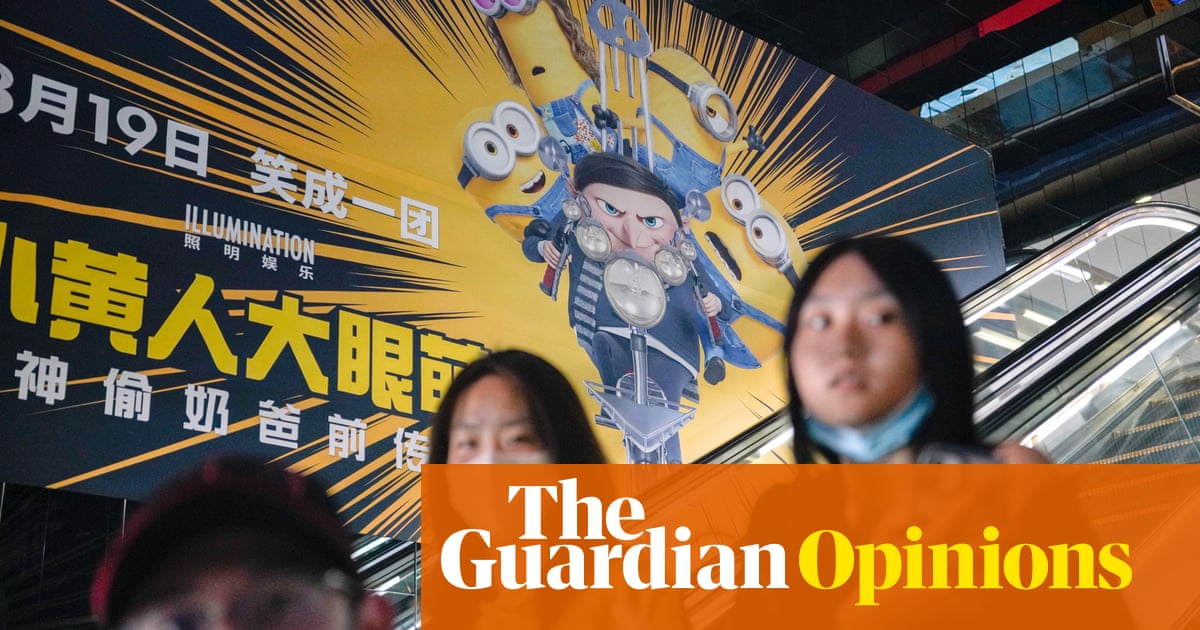The Guardian view on China’s censors: the sense of an (acceptable) ending
Show caption Chinese censors have altered the ending of the latest Minions movie, Minions: The Rise of Gru. Photograph: Wu Hao/EPA Opinion The Guardian view on China’s censors: the sense of an (acceptable) ending Editorial It is not just political matters that exercise Beijing but also the moral outlook of art and entertainment Wed 24 Aug 2022 18.49 BST Share on Facebook
Share on Twitter
Share via Email 1 month old
“The good ended happily and the bad unhappily. That is what fiction means,” Miss Prism explains in The Importance of Being Earnest. Censors in China agree, as shown by a crude addendum to Minions: The Rise of Gru. The original film saw the supervillain riding away with his conspirator Wild Knuckles, who had faked his death to avoid capture. Chinese viewers, however, learned via end titles that Wild Knuckles had in fact been arrested and jailed for 20 years, while Gru “returned to his family” and his biggest accomplishment is “being a father to his three girls”. So much for Despicable Him.
Similarly, the Chinese streaming site Tencent Video offered a starkly different conclusion to Fight Club earlier this year, though it is unclear whether censors imposed the change or the company was pre-empting their potential wrath. Hollywood’s version shows the narrator watching as multiple buildings explode – in an anarchistic, anti-capitalist plot hatched by his imaginary alter ego. No buildings were harmed in the Tencent version; instead, viewers were informed that “the police rapidly figured out the whole plan and arrested all criminals, successfully preventing the bomb from exploding”.
Officials have always been sensitive about any depictions that might hint at the nation’s shortcomings. They reportedly cut scenes from Mission: Impossible III because they felt that laundry hanging outside apartments reflected poorly on Shanghai. But their meddling goes beyond concerns that the Chinese Communist party and the country it rules must look at their best, to insisting that good must triumph.
The instinct is not exclusive to China. The US Production Code once dictated that film-makers inculcate “traditional values”. In more recent times, Hollywood has embraced amorality, but insisted on a triumph for uncomplicated good in movies such as Alien or I Am Legend, with studios doubting that a downbeat or morally ambiguous conclusion will find commercial success.
In China, the urge for a righteous outcome goes far wider and deeper. Mao Zedong saw art as a moral and political tool to reshape the population. This remained the template for officially sanctioned art even after his death, when an explosion of creativity produced more diverse and daring works. But it has received new emphasis under Xi Jinping, who has concentrated the party’s power, cracked down on spheres of influence from business to entertainment, and wants culture to foster “sound ethical values” and build a “positive image” of China. Last year saw the imposition of new regulations on broadcasters, including a bar on “vulgar behaviour” and “sissy” men.
In the context of the country’s extensive censorship, the determination to reform Gru is a trivial matter – but also a telling one, which typifies the direction of travel in an increasingly doctrinaire cultural environment. The influence of Beijing’s censors is felt outside the country, as US studios excise content in the hope of reaching the Chinese market, though usually material directly concerning China. At home, the insistence on dictating even the fate of animated characters has prompted mockery and irritation – and reminded viewers of the authorities’ insistence on treating them like children, whether kids’ cartoons or more adult matters are at stake.
Do you have an opinion on the issues raised in this article? If you would like to submit a letter of up to 300 words to be considered for publication, email it to us at guardian.letters@theguardian.com











